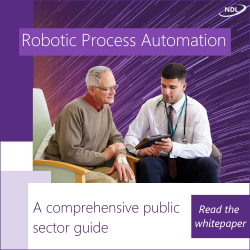
Image source: DLUHC
Emily Sullivan, head of product in the DLUHC Local Digital team, explains the ambition for the Future Councils programme to produce scalable approaches to meeting sector-wide challenges in the long term
Future Councils is a new programme from the Department for Levelling up, Housing and Communities (DLUHC). It aims to understand the recurring barriers faced by councils when trying to make their organisations more modern and resilient.
Working with a cohort of eight diverse councils to pilot the programme, the DLUHC Local Digital team is gathering evidence of what most stifles their progress, and developing recommendations for how we can help councils to address these challenges.
Through the pilot, we’re giving eight councils £750,000 each to work with us over a six-month period to address three common challenges:
- How to influence the organisation-wide factors that can unblock change.
- How to make digital and cyber improvements across the whole organisation, rather than just one team or area.
- How to reform services, including the big, critical services, which are riskier and harder to change.
Local government experience
I joined DLUHC five months ago with over 10 years’ experience working in digital, data and technology roles within local government. I’ve been brought into the Local Digital team to help them accelerate digital and cyber transformation across the sector, drawing on my experience in developing a digital vision and strategy for Nottinghamshire County Council, where I led the digital transformation of children’s services.
I know how much skill and effort goes into driving public services forward across the country and am passionate about driving forward the digital and cyber agenda in councils, to improve efficiency and unlock innovation. I also have first-hand experience of the unique challenges the sector faces to innovate, and meet new needs and increasing demand.
Councils are diverse and different organisations – geographically, demographically, economically, politically – the list goes on and on! While no two are the same, we do believe there are scalable ways of supporting the sector that are as yet untapped and underexplored. This is where the Future Councils programme comes in.
The pilot phase of Future Councils is now underway and will run until the end of October 2023. Over the past few months, we have been working with our council partners to understand individual council services, and together we are exploring the root causes behind what’s blocking them from becoming modern and resilient.
Root cause of blockers
Through the pilot so far, we’ve learned that the Future Councils programme requires flexibility and adaptability, while presenting an unusual value exchange.
We’re asking councils to tell us what they’re struggling with in a service, but our primary aim is not to fix that service in the short term – rather to understand the systemic root causes of service level challenges.
For example, one of the cohort has identified struggles in their waste service accessing the technology it needs to function effectively. Through investigating this together, we have found that making decisions to procure new technology is difficult in a democratic and commercially led organisation, especially in a challenging financial landscape – it’s not possible to keep up with technology needs.
To give another example, one of the pilot councils is struggling to prototype a new approach to delivering housing repairs. Together we have determined this is because sanctioning experiments in stretched services is not easy and takes too long. This systemic challenge could mirror the governance challenge described in the first example, and therefore we can explore opportunities for interventions that are able to tackle both, despite the service context being so different.
Collaborating with councils enables us to scan for potentially scalable opportunities by looking for similar systemic challenges with other pilot councils, even if the context in which they show up is different. By first working as a cohort, and then shortly looking to the wider sector, we can understand how these might be scaled further and how DLUHC might help the sector as a whole tackle these over time.
Thank you to councils
The approach we’re taking requires patience, openness and selflessness on the part of our partner councils. Their collaboration and willingness is, and will continue to be, critical in our endeavour to find genuinely scalable approaches to improve the sector in the coming months and years. We are both grateful for and dependent on collaboration with councils in order to successfully achieve this.
I’m so excited to be leading this work, and I hope the sector will share that excitement, particularly as we look to share what we’ve learnt so far with the wider sector to gather their invaluable input over the coming weeks.





